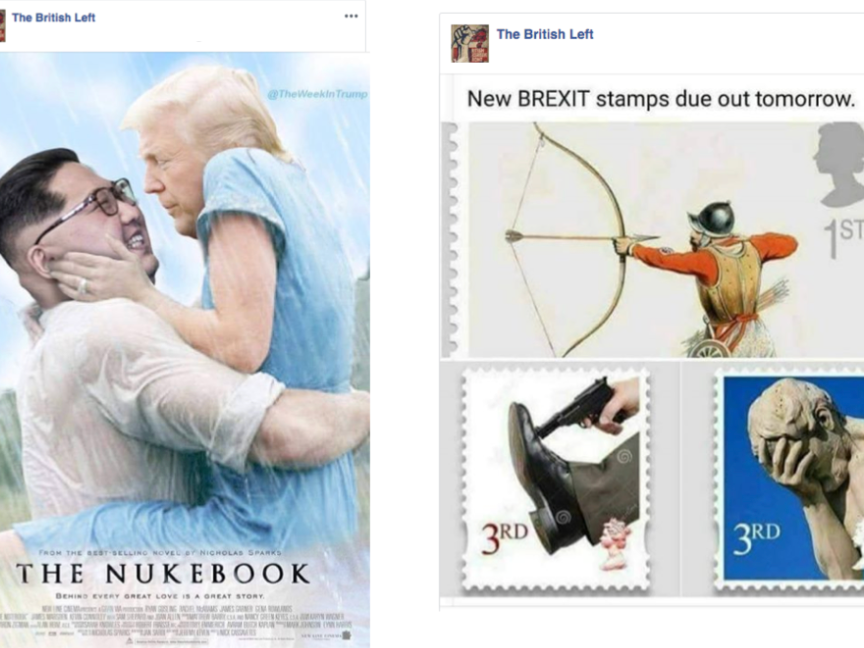
Facebook has removed hundreds of pages for “coordinated inauthentic behaviour” including those posing as news organisations to target UK, US, Latin American and Middle East users with political content.
The social network has taken down 652 pages, groups and accounts based in Iran after a number of campaigns were identified as using “similar tactics by creating networks of accounts to mislead others about who they were and what they were doing,” it said in an announcement yesterday.
Facebook began an investigation into a network of pages known as Liberty Front Press after a tip-off from cyber-security firm Fire Eye last month.
“Accounts and pages linked to Liberty Front Press typically posed as news and civil society organisations sharing information in multiple countries without revealing their true identity,” Nathaniel Gleicher, Facebook’s head of cyber-security policy said.
The first of the related accounts were created in 2013, but from 2017 they increased their focus on the UK and US following an intital emphasis on content relating to the Middle East.
Gleicher said Facebook had been able to link the network to Iranian state media through publicly available website registration information and the use of related IP addresses and Facebook pages sharing the same admins.
One of the pages, Quest 4 Truth, claimed to be an independent Iranian media organisation but was actually linked to Press TV, an English language news network affiliated with Iranian state media, Gleicher said.
Facebook shared examples of English language posts from pages like The British Left and Patriotic Palestinian Front, including fake images of Brexit stamps – including one showing a man shooting himself in the foot – and a parody of the poster for the film The Notebook with Donald Trump and Kim Jong-un (pictured top).
In the second part of its investigation Facebook linked another set of accounts and pages, the first of which was created in 2016, to Liberty Front Press after identifying they had been posing as news organisations and attempting to hack people’s accounts.
Facebook also uncovered a third set of disingenuously co-ordinated accounts and pages, first created in 2011, that largely shared content about Middle East politics in Arabic and Farsi, but also about UK and US politics in English.
The pages included one named Free Scotland 2014, which shared an image criticising the monarchy and a link in which Steve Bannon called for former Foreign Secretary Boris Johnson to challenge Prime Minister Theresa May for the premiership.

Posts from pages run from Iran which have been removed by Facebook. Picture: Facebook
Facebook said it first discovered this network in August last year and expanded its investigation in July as it “stepped up” efforts ahead of the US midterm elections in November.
The biggest of the pages, uncovered in the third investigation, was followed by around 813,000 accounts, while about 155,000 accounts followed at least one page in the main Liberty Front Press network.
A fourth and separate investigation resulted in the removal of pages, groups and accounts linked to sources previously identified by the US government as Russian military intelligence services.
Facebook said it has shared what it knows with the UK and US governments.
Facebook chief executive Mark Zuckerberg told reporters yesterday: “…When you operate services at the scale of the ones that we do, you’re going to see all of the good things that people can do around the world, and you’re going to see people try to abuse the services in every way possible as well.
“And certainly that’s been a theme that we’ve been focused on for the last couple of years – is making sure that it is hard for anyone to abuse the services, including, now, nation-states and folks who have very sophisticated and well-funded efforts that aren’t going to stop.
“We need to make sure that we continue strengthening the security operations that we have to be able to defend against those better.
We’re committed to doing that.
“And I think that while the efforts here are still early, I think that this is starting to show some real progress, too.”
However Facebook rejected the newspaper’s interpretation of the tool, saying it is a mechanism to assist its misinformation team’s fight against “false news”.
The system allows them to identify users who routinely report items as false because they disagree with the content or they are targeting a particular publisher unfairly.
Once someone has rated an article as false, and it is later confirmed by a fact checker, Facebook will give their feedback more weight than a user who reports many articles, some of which have been wrongly flagged as false.
A Facebook spokesperson said today: “The idea that we have a centralised ‘reputation’ score for people that use Facebook is just plain wrong and the headline in the Washington Post is misleading.
“What we’re actually doing: we developed a process to protect against people indiscriminately flagging news as fake and attempting to game the system.
“The reason we do this is to make sure that our fight against misinformation is as effective as possible.”
Email pged@pressgazette.co.uk to point out mistakes, provide story tips or send in a letter for publication on our "Letters Page" blog
